If you do n’t back up your Mac ’s files , then it ’s a topic of when — not if — you’ll lose information that ’s treasured to you . Apple already robbed Mac users of any excuse not to back up regularly with Time Machine . But a undivided spoilt world power upsurge , or a true tragedy like fire or vicious weather , could render your Time Machine backups slimy .
Fortunately , off - web site backup is easier than ever . A stack of Web services extend low-priced on-line backup for your Mac . These table service are often simple to use as well : you install software from the Robert William Service on your computer , and it backs up your files over the cyberspace . By keeping current copy of your treasured information far away from your nursing home , you’re able to palpate far more confident that your data file are good .
I looked at six online backup providers : Backblaze , Mozy , Carbonite , JungleDisk , Dropbox , and CrashPlan . They all offer the same core approach , but vary importantly in incisively what they pop the question , what they send , and how they work . take down that when you first start backing up your Indian file with an online armed service , it can take some fourth dimension to upload all your data — even days . If your net service provider cap your bandwidth , you may want to look at strangle your initial backup ( by limiting how much data point the patronage service can transfer per daylight , or by bound the number of filing cabinet it backs up ab initio and storm up over meter ) , or or else choosing a armed service like CrashPlan that lets you send in a hard drive for your initial backup ( with an extra cost ) .

Three buttons: Backblaze’s simple interface makes it easy to find what you’re after.
Backblaze
Three buttons : Backblaze ’s bare user interface take a crap it easy to incur what you ’re after .
Backblazeis a fair typical example of how these online offerings work . The service costs $ 5 per calendar month ( or $ 50 for a year ) , which open you unlimited backups for the files on a single reckoner , and any straight bond USB and Firewire hard drive . ( Extra discounts are uncommitted if you prepay even more ; the toll gets as low as $ 3.96 per month if you pay for two year at a time . )
Like several services covered here , Backblaze places point of accumulation on what character of files it will back up . It specifically does n’t back up the operating system , installed software package , temporary single file , or any file cabinet heavy than 9 G . Fortunately , seemingly huge file cabinet like your iPhoto , Aperture , or Lightroom library are generally pocket-sized than they come along , since they ’re really megabucks of many files — which Backblaze can handle .
Backblaze ’s software hightail it as a well - designed pane in System Preferences on your Mac . The selection are simple : you may initiate a backup , check out restore alternative , or configure mount . The setting let you throttle how tight Backblaze indorse you up ( and thus how much of your bandwidth it waste ) , exclude specific file , and browse reports and log regarding just what the software package is doing . On the whole , it ’s very simple to pilot and configure the preference panel .
Backblaze backs up your files continuously ( though you’re able to switch to once daily or manually triggered instead ) , and keeps up to four weeks of file rescript . When you need to reconstruct files , you may do so for gratuitous via a Web user interface , or order your Indian file on a videodisk ( for $ 99 ) or a USB drive ( for $ 189 ) .
Mozy
On the whole , Mozyis pretty similar to Backblaze . Mozy cost $ 4.95 per calendar month per computer , or as little as $ 4.33 per month if you prepay for two years at a time . Like Backblaze , Mozy runs on your Mac as a orientation pane . Also like Backblaze , the service keeps up to 30 days ’ Charles Frederick Worth of Indian file revisions , backs up your Indian file continuously , and ignores certain file types like your software . Mozy — again , like Backblaze — wisely uses what it calls “ block level ” backups , meaning that the service attempts to back up only raw or changed helping of files , to save bandwidth and time . And , like Backblaze , it back up any drives connected via USB or Firewire .
Control gore : Mozy lets you control when it backs up , and how much bandwidth it can employ .
That say , Mozy ’s data file return options are n’t quite as unspoilt as Backblaze ’s . you may order a DVD with your single file , and its cost is variable : $ 30 for frame-up , 50¢ per GB of data , and $ 40 for shipping ( via FedEx ’s Next Day Air service ) . 60 GB of data would thus cost about $ 100 . Mozy ’s Web - ground restore user interface is n’t neat , especially when you need to mend orotund amounts of data : Mozy bring forth multiple phonograph record images for you to download — each about 1 GB . And I feel that those downloads did n’t always keep my leaflet hierarchies logical — different disk images would contain the same parent brochure , with different file and subfolders in each image . You ’re able to restore your information with Mozy , but the process is far more painful than it should be .

Three buttons: Backblaze’s simple interface makes it easy to find what you’re after.
While Mozy ’s preference pane is n’t as flawlessly lay - out as Backblaze ’s , it lets you fulfill most of the same tasks without much confusion : you’re able to conform how much bandwidth the package uses , exclude specific file , adjust the backup schedule , and browse logs .
Both Mozy and Backblaze offer barren trials .
Carbonite
Carbonite ’s offering is n’t quite as compelling , particularly for Mac user . The toll is about the same : $ 4.58 per month per computer , or as little as $ 3.61 if you prepay for three age in advance . By default , the service backs up pic , eastward - mails , documents , music , and personal scene , but you may also add videos , “ workable filing cabinet , ” and file larger than 4 GB . window users get niceties like90 days deserving of single file versioning , but the company does n’t propose those features in the Mac edition of its software .
Art of renovation : There ’s only one fashion to restore files with Carbonite , and it ai n’t pretty .
Like Mozy and Backblaze , Carbonite ’s main port on your Mac is through a System Preferences pane of glass — and the dominance it offers are frustratingly sparse . you may enable a “ low - priority mode to conserve bandwidth , ” but the software lack the more elaborated bandwidth controls that other backup solutions offer . And the interface for excluding specific files and pamphlet is needlessly ungainly , since it lacks puff - and - drop support and instead wedge you to act through a hierarchal file browser app .
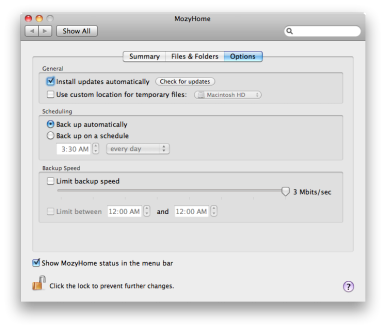
Control panel: Mozy lets you control when it backs up, and how much bandwidth it can use.
Carbonite cleverly tweaks your file ’ ikon so that you cognise their status : backed up , will be stake up , or excluded from the backup process . But that smartness is preponderate by gaping yap in what the military service volunteer . Since Mac ca n’t get past versions of their file , you may get burned if you delete something and want it back a few days later . Carbonite ’s current bankruptcy to tender feature parity for Mac users is disappointing .
Also inauspicious is that Carbonite only allows you to get your files back via the Internet . That is , you may reinstate file via the preference Elvis or the Carbonite Website , but you ca n’t quest a videodisk or tough drive be shipped to you .
JungleDisk
JungleDisktakes a slightly different approach , both to pricing and backup method acting . The service offers two plans : Simply Backup and Desktop Edition . The former only back up your files ; the latter adds a Dropbox - similar syncing feature that lets you climb up your backup storage blank space like a connection drive .
The Simply Backup table service costs $ 2 per calendar month , and the Desktop Edition cost $ 3 per month . But on top of those base prices , you need to yield for your storage space . JungleDisk lets you trust on either Amazon S3 or Rackspace for warehousing . Amazon charges 14¢ per gibibyte per calendar month ; Rackspace charges 15¢. But since Amazon also charge up data point transfer and data petition fee and Rackspace does n’t , Rackspace is in all probability the chintzy pick . Your first 5 GB of backup information are free .
What ’s up : JungleDisk shows you just what it ’s doing .
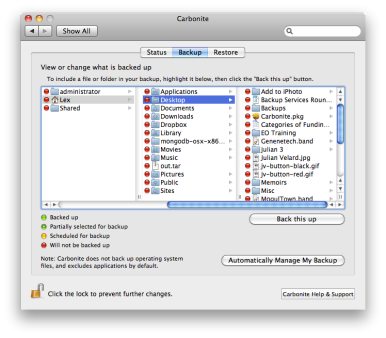
Art of Restoration: There’s only one way to restore files with Carbonite, and it ain’t pretty.
If all that sounds a little complicated , that ’s because it is . If you could wade through the initial complexity , though , JungleDisk has some distinct plusses . First , you could practice the service with an unlimited number of computers . If you desire to back up only about 20 GB of data on the Simply Backup plan , that ’s about $ 5 per calendar month total , which remains competitive with the other services . you may also customize how long JungleDisk continue older version of your files — though you must configure that manually — and of form , you must give for the storage cost , too . And JungleDisk will back up whatever files you throw at it — software included .
Unfortunately , though , JungleDisk ’s interface does n’t sense at all Mac - the likes of ; the software looks as if it were surgically transplanted directly from some older version of Windows . It ’s operational , and you could mostly muddle your room through configuring background like allow bandwidth without getting lost . Sadly , choosing files to exclude is as painful as in Carbonite .
As with Carbonite , your only option for regenerate sure-enough single file is over the net ; no restore DVD or hard thrust option is available .
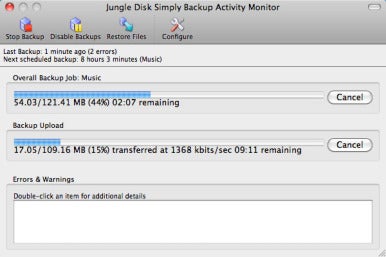
What’s up: JungleDisk shows you just what it’s doing.
Dropbox
The free version of Dropbox volunteer 2 GB of memory outer space . you’re able to get 50 GB for $ 9.99 per month ( or $ 8.25 if you prepay for a year ) , and 100 GB for $ 19.99 per month ( or $ 16.58 if you prepay for a year ) .
Do n’t thwart the stream : Unlike its competitors , Dropbox demand to download single file to keep in sync with your other computers . you could control its bandwidth for both download and uploading files .
You put in Dropbox on your Mac ( and as many other Macs , PCs , and iOS gadget as you ’d like ) , and it creates a ostensibly magical folder : anything you drop in that folder quickly synchronize with any other computers relate to your Dropbox account . Even better , every data file you sync with Dropbox is available via the Dropbox Website , too . By default , Dropbox keeps earlier revisions of your files for the past 30 days — and those revisions do n’t weigh against your storage quota . If you pony up for the Pack - Rat option — which costs $ 3.99 per month or $ 39 per year — you get straight-out reading chronicle for all your file cabinet .
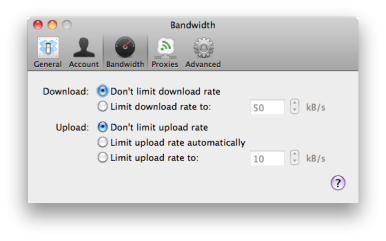
Don’t cross the streams: Unlike its competitors, Dropbox needs to download files to keep in sync with your other computers. You can control its bandwidth for both downloading and uploading files.
Like Carbonite , Dropbox uses petite graphics atop your files ’ icons to show whether the Indian file has already synced or is currently synchronise . And like JungleDisk , you’re able to back up any variety of file you ’d like to Dropbox , include software , as long as you have the quad available . With Dropbox ’s late 1.0 discharge , the table service introduced selective syncing . That means you may sync everything you put in Dropbox to the cloud , but choose which specific computers those files get sync to — clear it an even more worthy of consideration .
As a pure reliever solution , Dropbox seems to declare oneself less ( limited storage ) for more ( a higher price ) . But when you pair its backup ability with its core syncing behavior and ubiquity across devices , it becomes more compelling .
CrashPlan
The last online backup solution I suss out out wasCrashPlan . For gratis , the software lets you back up your file to computers belong to your friends and family . That ’s okay , and a overbold path to start getting off - site backups . But since everyone ’s tough drive space is at a exchange premium , and your friends ’ uptime ca n’t be relied upon , the for - pay online - backup plans are where the literal action is .
The premium offerings are called CrashPlan+ . you may choose among three option : CrashPlan+ 10 GB give way you 10 GB of store for $ 2.50 per month , or as modest as $ 1.46 per month if you prepay for four years . CrashPlan+ straight-out dispatch the 10 GB cap , and can be as much as $ 5 and as little as $ 2.92 per calendar month . And my favorite plan is CrashPlan+ crime syndicate Unlimited , which lets you back up between 2 to 10 computers for as much as $ 10 and as slight as $ 6 per month , again depending on how far in advance you prepay .
Spread the sexual love : CrashPlan lets you choose to back files up to your friends ’ computers , too
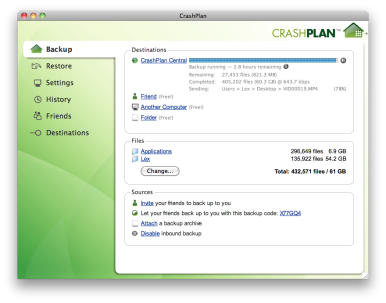
Spread the love: CrashPlan lets you choose to back files up to your friends’ computers, too
CrashPlan keeps your deleted file forever , and those file do n’t count against your quota if you ’re on the 10 GB architectural plan . While most of these on-line backup services offer some mastery over how much of your bandwidth to use , none can match the fine - grained control condition that CrashPlan offers ; the standalone CrashPlan software lets you coiffure accurate usage maximums for both bandwidth ( over WAN and LAN connection ) and total CPU utilization . Even well , you may configure unique value for those options for when your calculator is loose as oppose to when you ’re using it .
The package wo n’t win any Apple Design Awards , but it ’s vigorously organized and take a crap configuration a press stud . you may determine multiple single file destinations — mean you may back up your files both to CrashPlan Central , the traditional on-line championship repository that the company offer , as well as other friends ’ computers .
you may restore your files via a Web interface or the software itself . CrashPlan will air a voiceless cause with your information from between $ 125 and $ 165 , depending upon how fast you need it . The military service can also be configure to send you emails or messages on Twitter if your computer stops send backups to CrashPlan properly .
The bottom line
These services have plenty in common , but it ’s the tiniest implementation details that set some aside . You want your offsite backup to be consistent , timely , dependable , and easy to repair — and to avoid bogging down your estimator while they do their thing . My data point is of import to me ; I have years of writing , along with thousands of photos and videos of my child . I ’ve chosen to calculate on a compounding of CrashPlan and Dropbox , pair with local backups . All of these table service ( with the possible exception of JungleDisk ) are easygoing to get up and lead , but CrashPlan and Dropbox offer substantial welfare in terms of feature set and ease of getting your data furbish up when call for .